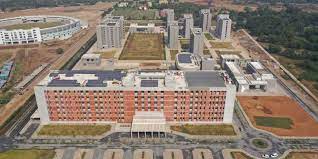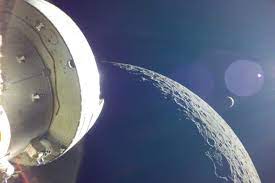
Current Affairs is the most important area in all competitive exams. But the difficulty level is very high. That’s why; many aspirants get confused, how to select Current Affairs for Preparation of Competitive Examination? In this Post, Daily Current Affairs 7 April 2023, we have tried to cover each and every point and also included all important facts from National/ International news that are useful for upcoming competitive examinations such as UPSC, SSC, Railway, State Govt. etc.
So, here is the Top News of the Day for 7 April 2023 to help you prepare the Latest Current Affairs part. After reading this section, you can successfully attempt Current Affairs Quiz.
Current Affairs for Competitive Exam – 7 April 2023
World Health Day 2023 celebrates on 7th April
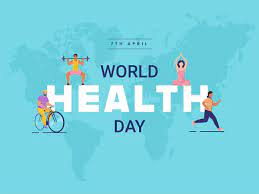
World Health Day 2023: Every year on April 7th, the World Health Day is observed to draw global attention to a specific health issue affecting people all over the world.This day is also significant as it coincides with the founding day of the World Health Organisation (WHO) in 1948. WHO is celebrating its 75th anniversary this year. The WHO selects a theme for World Health Day each year, and various activities and events are organised to raise awareness of the issue. The aim is to encourage governments, organizations, and individuals to take action to improve global health and well-being.
April 2023 Current Affairs Quiz
World Health Day 2023: Theme of the day
The theme of World Health Day 2023 is “Health For All,” with the goal of reflecting on public health’s achievements in improving people’s quality of life over the last seven decades. The theme emphasizes the need for the world to take necessary measures to address current and future health challenges. According to the World Health Organisation, the theme urges the world to take action towards addressing the existing health issues.
World Health Day 2023: Significance
World Health Day is a significant event as it aims to promote awareness and draw global attention to a particular health issue that impacts people worldwide. The day also marks the anniversary of the founding of the World Health Organization (WHO), which is a principal global health institution that works towards improving global health and well-being. Each World Health Day, the WHO selects a theme, and various activities and events are organised to raise awareness of the issue. These events provide an opportunity for governments, organizations, and individuals to come together and take action towards addressing global health challenges. By highlighting a specific health issue each year, the World Health Day helps to generate public awareness and advocacy for critical health topics, leading to better health outcomes for individuals and communities worldwide.
History of World Health Day
WHO is a significant global health institution that possesses a well-founded constitution and international credibility. The establishment of WHO was not a singular event, and it can be traced back to a series of milestones. Brazil and China proposed in the United Nations in December 1945 the creation of a global health organisation free of government control. In July 1946, the World Health Organization’s constitution was ratified, and on April 7th, 1948, it came into effect with the participation of 61 nations in its establishment. The first World Health Day was celebrated on July 22, 1949, but later moved to April 7th to promote student involvement.
For over five decades, the World Health Days have shed light on various health issues such as mental health, maternal and child care, and climate change. These events continue to raise awareness and promote activities that provide global attention to these critical aspects of global health beyond the celebration day. The WHO Director-General selects a new topic and subject for World Health Day each year, based on suggestions from member nations and WHO personnel.
Global trade expected to grow 1.7% in 2023: WTO
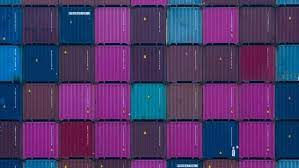
Global trade expected to grow 1.7% in 2023: WTO: Despite ongoing concerns about the Ukraine conflict, high inflation, and financial insecurity, the World Trade Organization (WTO) has increased its forecast for global trade growth in 2023 from 1% to 1.7%. This updated outlook indicates that the global economy is expected to recover faster than previously anticipated. However, the risks associated with these persistent issues remain, and could still impact the growth trajectory of the global trade landscape.
April 2023 Current Affairs Quiz
World Trade Organization’s: Trade Growth:
Despite an upward revision in the World Trade Organization’s (WTO) growth forecast for 2023, the global trade body has cautioned that the trade growth is expected to remain subpar due to multiple factors. These factors include ongoing conflicts such as the Russia-Ukraine conflict, stubbornly high inflation, tighter monetary policy, and financial uncertainty.
World Trade Growth: Below the 12-year average:
The projected trade growth of 1.7% for 2023 is also below the 12-year average of 2.6%, which has been the norm since the global financial crisis in 2008.
Covid Relaxation and Banking systems Failure:
However, the World Trade Organization has stated that the relaxation of COVID-19 pandemic controls in China is expected to “unleash pent-up consumer demand” in the country and contribute to an increase in international trade. WTO Chief Economist Ralph Ossa has also warned that interest rate hikes in advanced economies have revealed weaknesses in banking systems that could lead to wider financial instability if left unchecked. He emphasized the need for governments and regulators to remain alert to these and other financial risks in the coming months.
World Trade Organization (WTO): Trade growth to rebound:
Amid the uncertainties and risks facing global trade, there is some positive news as the World Trade Organization (WTO) expects trade growth to rebound to 3.2% in 2024. However, this estimate remains uncertain and heavily dependent on the outcome of the conflict between Russia and Ukraine.
Chhattisgarh’s Nagri Dubraj rice variety gets GI tag
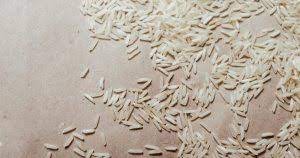
Chhattisgarh’s Nagri Dubraj rice variety gets GI tag: The Geographical Indication Registry has designated Nagri Dubraj, an aromatic rice variety from Chhattisgarh, as a geographical indication (GI). This will provide the brand with a unique identity and open up a wide market for it. Efforts have been made by authorities in Chhattisgarh for a long time to obtain the GI tag for Nagri Dubraj. The Indira Gandhi Agricultural University was critical in obtaining the rights because it maintained regular contact with the appropriate authorities. Furthermore, the rice is grown by a self-help group of women.
April 2023 Current Affairs Quiz
The “Maa Durga Swasahayata Samuh,” a self-help group of women from Nagri in Dhamtari district, has been growing and harvesting Dubraj rice and applied for the GI tag. Last year, the Chief Minister of Chhattisgarh, Bhupesh Baghel, pledged to take action to ensure that the fragrance of Dubraj rice returns to the farmers’ fields. Dubraj rice, also known as the “Basmati of Chhattisgarh,” is highly aromatic.
According to Dr. Girish Chandel, Vice Chancellor of Indira Gandhi Agricultural University, Dubraj rice is the second brand to be awarded a GI tag, following Jeeraphool rice in 2019. GI tags are given to entrepreneurs or groups of businessmen from specific areas, states, or countries. The issuance of GI tags is governed by the Geographical Indications of Goods (Registration and Protection) Act of 1999.
India slams OIC for its ‘anti-India’ agenda
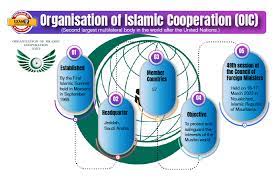
India slams OIC for its ‘anti-India’ agenda: India has harshly criticised the Organization of Islamic Cooperation (OIC) for its “anti-India” agenda, accusing the organisation of interfering in India’s internal affairs and encouraging extremism. In a statement issued on April 4, 2023, India’s Ministry of External Affairs (MEA) expressed its “strong protest” against the OIC’s statement, which it called “unwarranted and factually incorrect.”
April 2023 Current Affairs Quiz
India and Organisation of Islamic Cooperation (OIC):
India has slammed the Organisation of Islamic Cooperation (OIC) for its “anti-India” agenda after the group issued a statement expressing concern about violence and vandalism targeting the Muslim community in several Indian states during Ram Navami processions.
In the statement, the OIC General Secretary condemned such acts of violence and vandalism as evidence of rising Islamophobia and systematic targeting of India’s Muslim community. The OIC called on Indian authorities to take firm actions against the instigators and perpetrators of such acts and ensure the safety, security, rights, and dignity of the Muslim community in the country.
The Indian Ministry of External Affairs reacted to the OIC statement by calling it “factually incorrect” and accusing the organisation of spreading “anti-India propaganda.” The ministry stated that India is a secular country where the constitution guarantees freedom of religion to all citizens, including Muslims. It further emphasized that the incidents mentioned in the OIC statement were isolated and did not reflect the general state of religious harmony in the country.
Organisation of Islamic Cooperation (OIC) and The Kashmir issue:
India has previously criticized the OIC for its stance on the Kashmir issue, with the Indian government terming the group’s statements as interference in the country’s internal affairs. The OIC has condemned India’s revocation of Article 370 in Jammu and Kashmir, as well as its decision to divide the state into two union territories.
About Organisation of Islamic Cooperation (OIC):
The OIC is a group of 57 Muslim-majority countries that aims to safeguard the interests of the Muslim world. However, India has maintained that the group has no locus standi on matters concerning the country’s internal affairs. India has also accused Pakistan, a member of the OIC, of using the platform to further its agenda against India.
103rd birth anniversary of Bharat Ratna Pandit Ravi Shankar on April 7
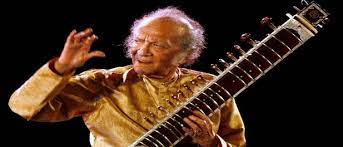
103rd birth anniversary of Bharat Ratna Pandit Ravi Shankar: Pandit Ravi Shankar, a world-renowned sitarist and composer, is widely regarded as one of the most influential figures in promoting Indian music throughout the world. On April 7, his 103rd birthday will be commemorated. He gained immense popularity among Western audiences for Indian classical music by collaborating with musicians from various parts of the world. His contribution to music was acknowledged by the Indian government, which awarded him the Bharat Ratna, the country’s highest civilian award, in 1999.
April 2023 Current Affairs Quiz
Early life of Pandit Ravi Shankar
Pandit Ravi Shankar (1920-2012) was an Indian musician and composer who was widely regarded as one of the greatest sitar players of all time. He was born in Varanasi, India, and began his music career as a young boy, studying under his guru, Allauddin Khan. Shankar went on to become a prolific composer and performer, best known for his sitar mastery and ability to blend Indian classical music with Western music styles. Shankar gained international fame in the 1960s through his collaborations with several Western musicians, including George Harrison of The Beatles. He was the first Indian musician to perform at major venues in Europe and the United States, and he was instrumental in introducing Indian classical music to Western audiences.
Throughout his career, Shankar received numerous awards and honors, including the Padma Vibhushan and the Bharat Ratna, which are among the highest civilian honors awarded by the Indian government. Shankar was a UNESCO Goodwill Ambassador and advocate for peace and cultural understanding in addition to his musical accomplishments. He died in 2012, at the age of 92, leaving a legacy as one of the twentieth century’s most influential musicians.
Pandit Ravi Shankar received numerous awards and recognitions throughout his career, including:
- Padma Bhushan (1967): One of India’s highest civilian honors, awarded for distinguished service of a high order in any field.
- Padma Vibhushan (1981): The second-highest civilian award in India, awarded for exceptional and distinguished service to the nation in any field.
- Kalidas Samman (1986): A prestigious arts award given by the Madhya Pradesh government for outstanding achievement in the field of Indian classical music.
- Sangeet Natak Akademi Award (1987): The highest Indian recognition given to practicing artists, conferred by the Sangeet Natak Akademi, India’s National Academy of Music, Dance, and Drama.
- Honorary Doctorate Degrees: Shankar received honorary doctorate degrees from several universities, including the University of Delhi, the University of York, and the University of California, Los Angeles.
- Grammy Awards: Shankar won three Grammy Awards in his lifetime, including a Lifetime Achievement Award in 2013, posthumously.
- Bharat Ratna (1999): The highest civilian award in India, awarded for exceptional service towards the advancement of art, literature, and science, and in recognition of public service of the highest order.
- UNESCO Goodwill Ambassador: In 1999, Shankar was appointed as a UNESCO Goodwill Ambassador in recognition of his contributions to music and cultural understanding.
Other governmental and academic honours
- Ramon Magsaysay Award (1992): Asia’s highest honour, given for outstanding contributions to public service, community leadership, journalism, literature, and creative arts.
- Commander of the Legion of Honour of France (2000): The highest French order of merit for military and civil merits, awarded for exceptional achievements in the fields of arts, science, and culture.
- Honorary Knight Commander of the Order of the British Empire (KBE) for “services to music” (2001): An honorary title given by the British government to foreign nationals who have made significant contributions to music, art, literature, or science.
- Honorary member of the American Academy of Arts and Letters: An exclusive honor society of the most accomplished individuals in the arts, literature, and music.
- Honorary Doctor of Laws from the University of Melbourne, Australia (2010): Awarded for exceptional contributions to music and cultural understanding.
Several books written about Pandit Ravi Shankar, including:
- “My Music, My Life” – An autobiography written by Pandit Ravi Shankar himself, detailing his early life, musical training, and career.
- “Raga Mala: The Autobiography of Ravi Shankar” – A revised and expanded edition of his autobiography that includes additional material and insights from the later years of his life.
- “Ravi Shankar: A Life in Music” – A biography of Pandit Ravi Shankar written by music journalist Timothy White, which explores his life and legacy in depth.
- “Pandit Ravi Shankar: The Man and His Music” – A comprehensive study of Pandit Ravi Shankar’s music, written by musicologist Ashok Ranade.
- “Indian Music in Performance: A Practical Introduction” – Pandit Ravi Shankar and George Ruckert co-wrote this book, which serves as a practical guide to understanding and performing Indian classical music.
Amit Shah Unveils 54-Feet-Tall Statue Of Lord Hanuman At Gujarat Temple
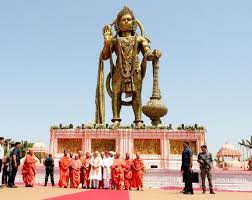
Amit Shah Unveils 54-Feet-Tall Statue Of Lord Hanuman At Gujarat Temple: Indian Home Minister Amit Shah has unveiled a 54-feet-tall statue of Lord Hanuman at a temple in Gujarat, India. The statue, made of bronze, was installed at the Hanuman temple in Shah’s hometown, Naranpura, in Ahmedabad.
April 2023 Current Affairs Quiz
More About The 54-Feet-Tall Statue Of Lord Hanuman:
The Hanuman Seva Samiti, a trust affiliated with the temple, built the statue, which stands on a 48-foot-tall pedestal, at a cost of around Rs 30 crore ($4 million USD). It is said to be one of the tallest Lord Hanuman statues in the world. In his address at the unveiling ceremony, Shah said that the statue is not just a symbol of devotion but also a message of India’s cultural heritage and spirituality to the world. He added that the statue will become a major tourist attraction and boost tourism in the region.
The statue was installed with the help of a crane and the whole process took several hours to complete. The statue’s face was unveiled first, followed by the body and the tail. The entire process was telecast live on television channels.
Lord Hanuman is a Hindu deity revered for his strength, bravery, and devotion. He is thought to have played an important role in the Hindu epic Ramayana, assisting Lord Rama in rescuing his wife Sita from the demon king Ravana.
Significance of this:
The unveiling of the statue has been welcomed by many people in Gujarat, who see it as a symbol of pride and devotion. However, some have criticized the project, saying that it is a waste of public money and resources.
The installation of statues has been a contentious issue in India, with some accusing the government of promoting a particular religion through such projects. However, supporters argue that such statues help promote the country’s cultural heritage and boost tourism.
RBI penalises Mahindra Finance, Indian Bank over disclosure of interest rates to borrowers
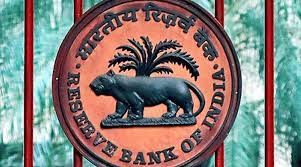
RBI penalises Mahindra Finance, Indian Bank over disclosure of interest rates to borrowers: The Reserve Bank of India (RBI) announced penalties for noncompliance with regulatory norms against Mahindra & Mahindra Financial Services Ltd, Indian Bank, and Muthoot Money Limited. Mahindra & Mahindra Financial Services Ltd has been fined Rs 6.77 crore for failing to comply with norms related to the disclosure of interest rates to borrowers at the time of loan sanction.
April 2023 Current Affairs Quiz
Meanwhile, Indian Bank has been fined Rs 55 lakh for contravention of certain Know Your Customer (KYC) norms, and Muthoot Money Limited has been fined Rs 10.50 lakh for non-compliance with certain provisions of the ‘Monitoring of Frauds in NBFCs (Reserve Bank) Directions, 2016‘. These penalties demonstrate the RBI’s commitment to enforcing regulatory guidelines and promoting transparency and compliance in the Indian financial system.
Need of the penalizing Mahindra Finance and Indian Bank:
In 2019, the RBI issued guidelines to all Non-Banking Financial Companies (NBFCs) and banks requiring them to disclose the applicable interest rates and other charges related to loans provided to customers in a transparent manner. This includes information about the interest rates, processing fees, prepayment charges, penal interest, and any other fees or charges that may be applicable.
However, during an inspection conducted by the RBI, it was found that Mahindra Finance and Indian Bank had failed to comply with these guidelines. Mahindra Finance was found to be non-compliant in 2019, while Indian Bank was non-compliant in 2020.
According to the RBI, the penalties were imposed based on the severity of the noncompliance as well as the size of the respective banks. The penalties are also aimed at sending a message to all NBFCs and banks that they must strictly adhere to the RBI’s guidelines regarding the disclosure of interest rates and other charges.
Mahindra Finance and Indian Bank have been instructed to take necessary measures to comply with the RBI’s guidelines and submit a compliance report to the RBI within a stipulated time frame.
Non-compliance with the guidelines:
This is not the first time the RBI has penalised banks and NBFCs for failing to follow its guidelines. The central bank has been taking a tough stance on such violations, in order to protect the interests of borrowers and ensure transparency in the lending process.
In conclusion, the penalties imposed by the RBI on Mahindra Finance and Indian Bank serve as a reminder to all banks and NBFCs to comply with the regulatory guidelines in order to avoid similar action by the RBI. The RBI’s efforts to ensure transparency in the lending process will go a long way in strengthening the Indian financial system.
India plans green hydrogen incentives of at least 10% of cost

India plans green hydrogen incentives of at least 10% of cost: India plans to give green hydrogen fuel producers incentives worth at least 10% of their costs under a $2 billion scheme set to begin before the end of June, a top government official said. The govt has approved a 174.9 billion rupee incentive plan to promote green hydrogen to cut CO2 emissions and become a major exporter in the sector.
April 2023 Current Affairs Quiz
The government will give incentives worth at least 30 Indian rupees per kg for production of green hydrogen fuel, the official, who is directly involved but did not want to be identified because the discussions are private, told Reuters.
The cost of manufacturing green hydrogen in India is about Rs 300/ kg and the government will give incentives worth at least Rs 30/kg for the production of green hydrogen fuel.
In response to a query from Reuters, India’s Renewable Energy Secretary Bhupinder Singh Bhalla said the incentives will be awarded through a competitive bidding process, and the incentive amount will taper down annually.
“Draft concept notes on the programme have been circulated to industry chambers and associations for consultations,” he said.
Punjab government launched Punjab’s ‘CM di Yogshala’ programme
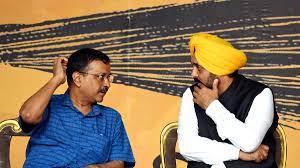
Punjab government launched Punjab’s ‘CM di Yogshala’ programme: AAP national convener Arvind Kejriwal and Punjab Chief Minister Bhagwant Mann Wednesday launched the ‘CM di Yogshala’ programme in Patiala, Amritsar, Ludhiana and Phagwara.
Aim: To create a mass movement to carve out a healthy and prosperous Punjab.
April 2023 Current Affairs Quiz
The initiative was initially launched for four cities of the state: Patiala, Amritsar, Ludhiana, and Phagwara The formation of these Yogshalas will be under a pilot project. Trained Yoga instructors will impart free Yoga training to people in open parks and other public places.
Punjab CM: Bhagwant Mann
RBI keeps repo rate unchanged at 6.50%
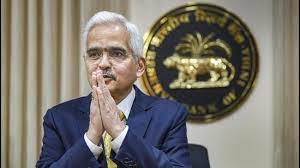
RBI keeps repo rate unchanged at 6.50%: The Reserve Bank of India (RBI) has announced its bimonthly monetary policy and kept the repo rate unchanged at 6.50%.
April 2023 Current Affairs Quiz
The GDP is expected to jump 6.5% in the current financial year. Retail inflation is expected to moderate to 5.2% in FY2023-24.
The standing deposit facility (SDF) would remain unchanged at 6.25%, and the MSF rate and the bank rate at 6.75%. In Q1FY24, CPI-based inflation is expected to be 5.1%. The real GDP growth in 2022-23 was 7%.



